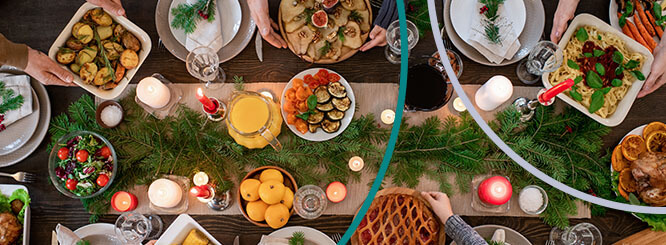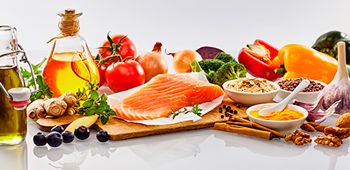
During the holiday season, people gather with friends and family to celebrate their traditions, catch up on good conversation, exchange gifts, and many do this either while cooking or having big, delicious dinners. So, we end up relating those good, cozy feelings of friendship, love and festivity, with the idea of self-indulging in some pretty heavy eating and drinking for a few days or weeks.
There’s nothing wrong with this, in fact, cooking and eating is a great activity that bring people closer together, strengthens their affective bonds and builds cheerful memories, but… if we lose track of how much and what types of foods we are eating, it can also lead us to gaining significant weight in a very short period of time or losing track of our own personal goals, making it harder to return to healthier habits in the short term.
This is why we need to learn how to enjoy everything we love about the holidays while at the same time being careful and strategic about what we eat and drink during these days.
In what follows, we will share a list of 20 tips that you can follow to eat healthy during the holidays. Following as many of these tips as you can during the holiday season can help you enjoy all the experience of celebratory eating without any guilt or regrets later.
1. Stick to your regular eating schedule.
We know that during the holidays we end up doing activities that we usually don’t do the rest of the year. We wake up late, we go out more, we watch more TV, we go out on more leisure trips, you name it. But…don’t let these changes affect your eating schedule. For instance, if you usually take breakfast at a certain time, try sticking to that as you regularly do. This is important because if you make changes to your eating hours or if you end up fasting for a few hours, your metabolism tries to adapt and kind of slows down to manage your energy and appetite. A slow metabolism is not the most convenient thing to have for the holidays.
2. Don’t skip meals trying to compensate for a heavy dinner.
This advice is somehow linked to the previous one. The same logic applies here. For instance, don’t skip lunch because you are thinking of having a heavy dinner for Christmas eve. Skipping meals as a compensation strategy for eating more later triggers two undesirable things: 1) it slows your metabolism, as the body adapts to the idea of maybe having to thrive with food for longer periods of time; and 2) it makes you hungrier before the big meal, which then makes you want to eat more just to satiate that self-inflicted hunger! Being hungry usually makes it easier for us to overeat or to choose make very poor choices on what to eat.
3. Select your favorite dishes.
We are not suggesting you should deprive yourself of eating during the holidays, we are just saying that you just need to eat strategically! Think of those dishes that you love and that you know you can’t just miss during the holidays, and make a list of priorities. Limit yourself to eating those dishes and, if you get satiated, stop there. Don’t reach for all the other dishes available.
4. Start with proteins.
Instead of starting with snacks or chips, or even vegetables or side dishes, begin your dinner by eating your portions of protein. Proteins keep you satiated longer and are more nutritious.
5. Eat more vegetables.
Once you finish your protein, eat plenty of vegetables. It’s better to satiate more from vegetables than from carbs, fats or desserts. Also, vegetables act faster on your metabolism than other heavier meals.
6. Remember that drinks add up to your calories too!
Be careful with overdrinking sugary cocktails or sodas. If you do, you will gain empty calories that will spoil your appetite. Pick your favorite cocktail or drink and sip it slowly through the night, make it last. After that, prefer water.
7. Be mindful of your portions.
Prefer small portions of different types of dishes instead of big portions of two or three foods. This way, you can enjoy a variety of dishes without getting full too quickly. But be careful to not over-do it. Don’t add up small portions to a heavily served plate.
8. Serve yourself.
This advice is closely related to the last one. Be the one who serves your plate so you can choose carefully what to eat and in which proportion.
9. Don’t skip your regular exercise.
Keep on doing your routine exercises as usual during the holidays. You either indulge in eating or indulge on skipping exercise… but not both! Remember that exercising also helps with your metabolism.
10. Keep yourself active.
During the holidays, avoid sedentary behavior. Go out walking, shopping, give your dog a walk, help clean the house… whatever it is, try to keep yourself active. This will help you burn more calories throughout the day.
11. Prefer homemade food instead of processed foods.
This applies if you are the one who’s cooking or when it comes the time to serve your own plate.
12. Choose healthier ingredients for your favorite dishes.
If you are cooking some dishes for the big dinner, prefer healthier ingredients. For instance, instead of using a thick salad dressing, try a vinaigrette; instead of using animal fat, try some vegetable oil, etc.
13. Eat slowly.
Eating slowly prevents you from overeating as it allows your body signal satiety on time. If you eat too quickly, you start feeling full once you have eaten way too much.
14. Chew thoroughly.
Chewing thoroughly allows you to eat slower, as the tip before, but it also helps your metabolism. Chewing thoroughly makes you produce more saliva and it breaks down your bites to pretty small pieces, these two things makes food easier and faster to digest.
15. Don’t wait until you are too hungry.
We mentioned this before on tip 2. Remember to eat your meals on time and don’t wait until you are too hungry. Hunger usually makes you overeat.
16. Resist temptations coming from others.
During the holidays, people will invite you to try many different dishes. Thank everybody and be polite, but don’t feel obliged to eat everything they offer you. Have little tastes of food and then just choose the dishes that you have decided to eat.
17. Recover on your healthy eating on the next meal or on the next day.
So, you ate a lot the day before? That’s ok. Today you can go back to your regular healthy eating. If you go back to your healthy habits as soon as possible, they body goes right back to behaving as it was before. Don’t think of your last day as a progress lost, but as a moment that needed to be enjoyed.
18. Sleep well.
Sleeping your 8 hours and resting well helps you maintain your good metabolism and at the same time it helps you to take better decisions while eating.
19. Keep yourself committed to your goals, but don’t obsess over them for now.
There’s a moment for everything, and holidays are just the time to enjoy of good company and cherish on to good memories. Don’t let your goals keep you away from appreciating these moments or living them fully.
20. Indulge and enjoy.
Enjoy the holidays, enjoy your food. Self-indulge a little on this very special day, and don’t hold any regret. Tomorrow you can go back to your regular eating and continue on with your goals.
Contact us
At LIMARP International Center of Excellence for obesity, we offer integral bariatric programs for weight loss that adapt to every patients’ needs. Call us today to schedule a consultation. Our team will be glad to help.


